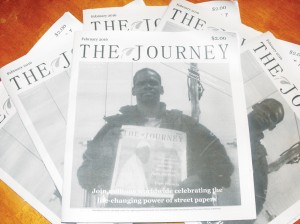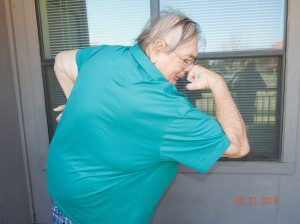
Published erratically during its first couple of years, The Journey has been bimonthly for about a year now. Editor Annette and publisher Stephen have been working to pump it out as regularly as possible over the last few years, particularly since the team was able to move into the stable and affordable Villages at Samaritan House in 2012.
Some of The Journey’s articles are original, others scoured from the internet. A recent issue included articles on the rising number of homeless in Tarrant County (nearly 2,000 people per night); new approaches to homelessness in Dallas; a story by an Afghan War veteran coming to terms with his service; and a dozen others. There are also pages devoted to homeless services, food pantries, and shelters, plus pages of puzzles and, for homeless children, coloring.
“I collect the articles, choose the original material, keep listings up to date,” Annette said. “I even design the puzzles. Stephen sees that it gets published and distributed.”
Distribution for the paper follows the international street paper format: For The Journey, homeless people can ask for 10 copies of the $2 paper for free. The person who sells it can either keep the money or return it for more copies at only 50 cents each.
“The whole idea,” Stephen said, “is to give people some hope. It’s not hard to sell the paper. A lot of people don’t mind giving a couple of bucks to someone if they see that person is trying to make a living, rather than just panhandling. So our vendors wind up with regular customers.”
Seed money, Stephen said, came from “a couple of bucks” his father left him when he died.
“That’s what I put it in,” Stephen said. “It wasn’t a good financial investment, but it was a good investment for the heart.”
Stephen and Annette have seven regular distributors and several others who come by now and then for their 10 free copies. Annette estimates that The Journey has a monthly circulation of about 1,000. The couple’s primary vendor — and recruiter for other vendors — has made up to a “couple hundred dollars a week,” Stephen said.
But it isn’t just the money that’s important. “A lot of street people have no money management skills, and few people skills, so they wind up just begging,” Stephen said. “Selling the paper gets them interacting with people they normally wouldn’t interact with, and then they are also learning how to handle money, and they get a sense of accomplishment. You don’t know what that means to people who have gotten so low that they’re living on the street. Man, you feel like you’re worth nothing. So this paper is a good deal all around. And Annette is a great writer, so it’s all a natural. Plus, if I go, I want her to have something she can depend on to help her get through. That’s important to me. I didn’t always think that way, but then I didn’t think I’d wind up with cancer, either.”
As the only publication of its kind in Fort Worth, The Journey is a valuable part of the entire community, Stephen said. “The paper serves the homeless community by telling them where they can get the services they need,” he said, “and by providing some of them with a way to earn money and earn the self-esteem that comes with it. But it also serves the general population by showing them the pitfalls and problems faced by the homeless community on a daily basis, which are enormous. We’re really trying to make it clear to the average person that homeless people are just people. It’s one thing to say that. It’s another thing to get people to really understand that.
“And if I could,” he continued, “I’d bring the circulation up to 3,000 or 5,000 or more. There’s a lot of people who could get helped by being part of this.”
******

The hallway leading to the Karnes’ one-bedroom apartment is drab. It has the feel of poverty. But the apartment is surprisingly bright. There is a lovely kitchen with modern appliances which leads through a large arch to a living room that opens up onto the porch. A bedroom is off to the left, and to its right is a large bathroom suitable for the two wheelchairs they use to get around.
The other day, several copies of The Journey sat on the kitchen table, with several bundles stacked in a corner of the living room.
Stephen and Annette sat in well-used recliners separated by a small table. “The cancer surprised me,” he said.
“It surprised both of us,” added Annette.
“It really shouldn’t have, because I smoked for 40 years. I quit when I found out I had the COPD, but nobody saw the cancer until just a couple of weeks ago, and they tell me it’s really late in the game for me. Now they’re telling me it’s at a point where they can use radiation and hope to get it. That’s good. I try to stay optimistic.”
“Optimism is a primary tool for us,” Annette said. “I’ve already fought my way back from a negative place once, and it was a long, hard road. And so has Stephen. Now it’s our turn to give what we can, while we can.”












The next time the Weekly presents an article defending recreational marijuana, remind yourselves of the Karnses. They have in all likelihood taken much more from society than they’ve given, and to portray them as heroes wanting to “give back” is a little rich.
You certainly place yourself in a position to judge others. Apparently you don’t subscribe to the notion that someone can turn their life around and become something better than they were. I’ve worked with Stephen and Annette and, just from your comment, it’s obvious they’re better human beings than you. Thing is, you too can change. Good luck. I feel sorry for you.
Kenneth: You criticize me for judging; then you judge me. Sweet hypocrisy. It’s certainly a good thing if the Karneses have turned their lives around, but a taxpayer always has standing to inquire into the use of his money. And my original supposition has not been rebutted. You know the couple so perhaps you can answer. Did they or not receive more in government benefits than they gave?
Robert: You’re very tough, man. A person might take, or make a mistake, and then change. You want to count your tax dollars on that? You want to know how many kids got through their respective grades based on the school tax you paid, or whether the sheriff actually gave the inmates good tuna sandwiches or lousy tuna sandwiches for which he billed you and me $1 each?
You sound like the father I’m glad I never had. My dad just beat me with a spoon 100 times, or left me in a room for three days with no food or water. That was easy. You sound difficult to please. I’m probably 15 years older than you but glad you were not my dad with all your judgements!!!!!!
Sorry, Peter Gorman, I was born before Feb. 1951, which makes me older than you and the Karneses. And how could you know my age anyway?
Mr. Karnes says 1968-70 were “crazy times” as if dealing pot, dropping acid, and robbing stores was the norm. They weren’t crazy times for me. See, I had a job. When I needed to make a change, I returned to and finished college at age 39. In the following 3 years, I obtained my doctorate, riding a bicycle 6 miles a day roundtrip to save money and keep me fit. Student loans helped; and there was no whining about paying them off. Rather, I paid them off early, ever grateful to taxpayers who financed my degree.
Now I regularly bicycle 4 miles each way to work, not to save money as in the lean years, but to stay fit. Which brings up the Karneses’ health problems. Your article says they are to blame for some of their health problems. Really? Which problems did they not bring upon themselves? It’s obvious that they’re morbidly obese. During your interview, you might have told them that regular exercise and a healthy diet might alleviate some of their problems.
Personal responsibility is what I’m talking about. It’s great that the Karneses are clean now; but pretending that their newsletter repays society for all they’ve taken and continue to take, is a stretch.
Hey Bobby…you taking responsibility for the earth-quakes and rotten air we breathe, and damaged roads and highways you’ve screwed up, and lies you and your butt-wipe buddies told us squares about your gas-drilling racket? The State Pens are full of folks more honorable, humble, and I expect that smell better than you. You dug it, lay down in it. Decent folks don’t want to live on the same street as you. You can put your personal responsibility in your ear. You are a pure loser as a citizen and example for our youth. Our asylums are slam-packed with less deviant souls. Good grief. Fool. Get a life.
This was a nice story about two people keeping good attitudes about life. I found it inspiring. I doubt that recreational marijuana use had anything to do with leading them to pills and crack and other hard drugs that ruined their health but I guess someone could reasonably make that claim. Either way, Robert K. seems kind of heartless in his attitude about them.
Robert K. is the boss of the gas-drilling rats here in Tarrant County and nearby counties. Our Texas jails and asylums are packed with more honorable citizens. My bird-dog Roxy has a much bigger heart, smells better, is smarter, and probably will get to Heaven ( at least has a shot at it… Bobby is a pure looser in that regard). Bobby boy is a black-hearted, Tea-Bagging loser…put him on your Prayer List.